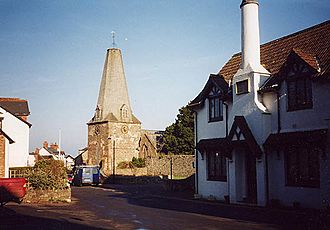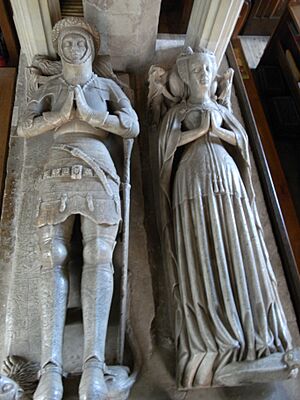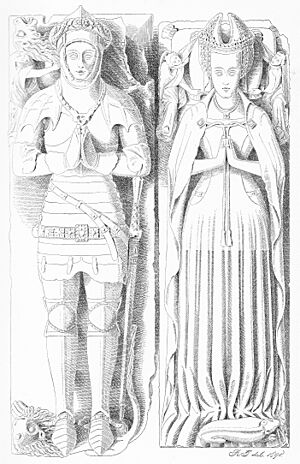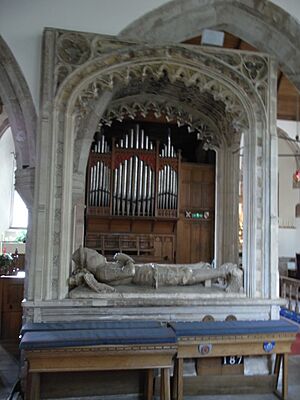Church of St Dubricius, Porlock facts for kids
Quick facts for kids Church of St Dubricius |
|
|---|---|
 |
|
| General information | |
| Town or city | Porlock |
| Country | England |
| Coordinates | 51°12′31″N 3°35′44″W / 51.2087°N 3.5955°W |
| Completed | 13th century |
The Church of St Dubricius in Porlock, Somerset, England, is a very old church. It was built in the 13th century. This church is so important that English Heritage has given it a special status called a Grade I listed building. This means it's one of the most important historic buildings in England and is protected.
Contents
Who Was Saint Dubricius?
The church is named after Dubricius, who was also known as Dyfrig in Welsh. He was a saint from the 6th century. People believe he might have traveled to this area, which is why the church is dedicated to him.
History of the Church
The Church of St Dubricius stands where an even older church might have been, possibly from around 1120. The church has been repaired and updated many times over the centuries.
- In the 15th century, some major restoration work was done.
- A big storm in 1703 damaged the church's spire, which is the tall, pointed part of the roof.
- More repairs, known as Victorian restoration, happened between 1888 and 1891.
Inside the Church
Inside the church, you can see some amazing historical items.
The Harington Tomb
One of the most impressive things is a beautiful tomb made of alabaster from the late 15th century. This tomb belongs to John Harington, 4th Baron Harington (who lived from 1384 to 1418) and his wife Elizabeth Courtenay (who died in 1471).
- John Harington fought alongside King Henry V in France in 1417.
- Elizabeth Courtenay married again after John died.
- The statues on the tomb show John Harington wearing armor from around 1470. This was the style of armor worn when his wife died, not necessarily when he died in 1418.
- People believe this monument was paid for by Elizabeth's step-daughter, Cicely Bonville.
- The tomb is considered very high quality, so much so that it looks like it belongs in a large cathedral rather than a smaller country church.
The Ancient Clock
At the back of the main part of the church, called the nave, there is a very old clock. This clock dates back to the early 15th century.
- It used to strike the tenor bell every hour.
- Interestingly, this old clock does not have any hands or a clock face.
- It was used until 1897. A new clock was put in place to celebrate Queen Victoria's Jubilee that year.
Church Community
The Church of St Dubricius is part of a group of churches in the Exmoor area. This group includes churches in Porlock, Porlock Weir, Stoke Pero, Selworthy, and Luccombe.
See also
- Grade I listed buildings in West Somerset
- List of ecclesiastical parishes in the Diocese of Bath and Wells
 | Janet Taylor Pickett |
 | Synthia Saint James |
 | Howardena Pindell |
 | Faith Ringgold |




